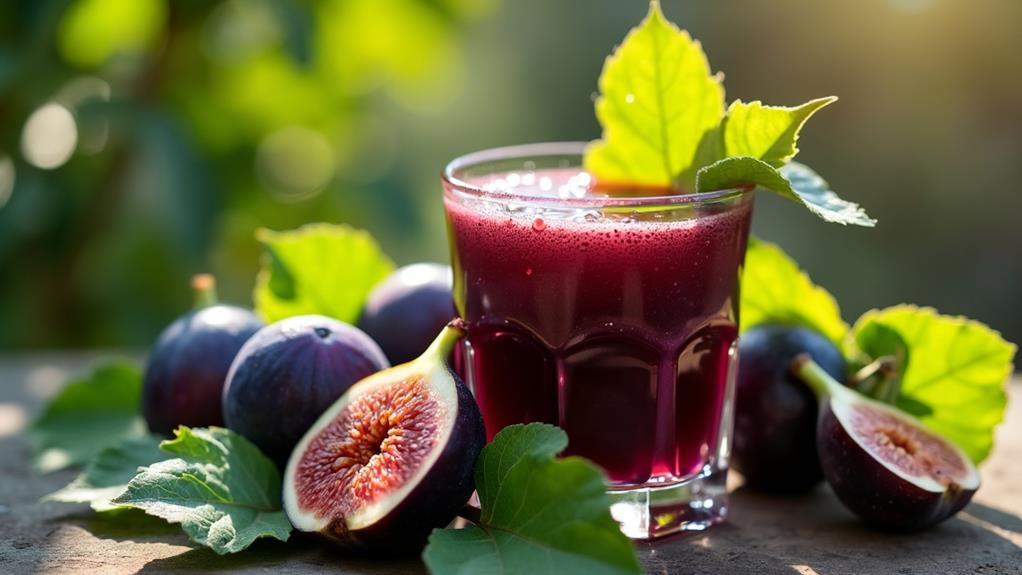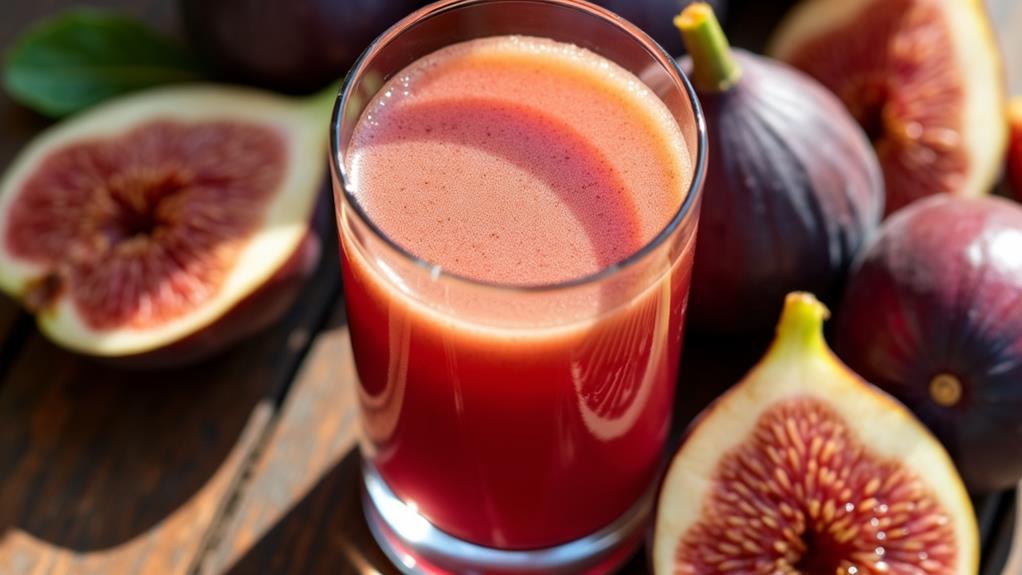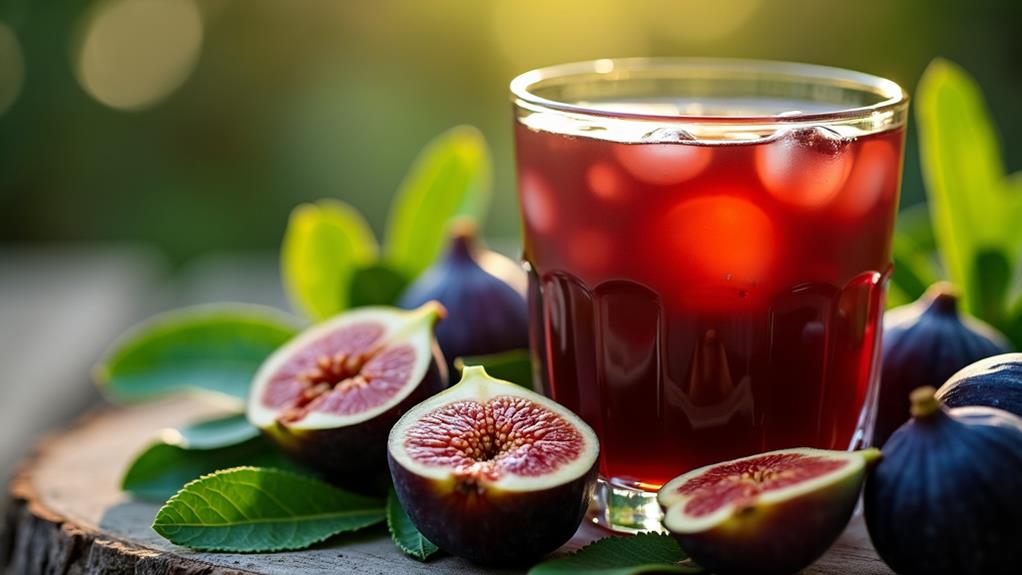Fig Juice: Sweet and Nutritious for Digestive and Skin Health

You'll love fig juice for its sweet taste and incredible health benefits. It's high in dietary fiber, which promotes digestive health by ensuring regular bowel movements and alleviating constipation. Rich in vitamins A, C, and E, it supports skin hydration, soothes irritation, and helps maintain a radiant complexion. The antioxidants combat oxidative stress, leaving your skin fresh and glowing. Plus, with vital minerals like potassium, it regulates digestive fluids, enhancing gut efficiency. Fig juice is also low in calories, making it a guilt-free pleasure. Uncover more ways this delightful juice can enhance your health and wellbeing.
Nutritional Benefits of Fig Juice
Fig juice frequently stands out as a powerhouse of nutrition, packed with benefits that support your thorough well-being. It's rich in dietary fiber, which is essential for maintaining digestive health. By integrating fig juice into your diet, you aid in alleviating constipation and promoting a healthy gut. Beyond digestive benefits, fig juice is loaded with crucial vitamins, including A, B, C, and K. These vitamins are vital for numerous bodily functions, particularly for maintaining skin health and bolstering your immune system.
The antioxidants in fig juice, especially polyphenols, play a significant role in combating oxidative stress and potentially reducing inflammation throughout your body. These antioxidants help preserve your overall health by protecting your cells from damage. Furthermore, fig juice is a good source of significant minerals like potassium and calcium. Potassium supports your cardiovascular health, while calcium strengthens your bones.
With only about 74 calories per 100g, fig juice is a low-calorie beverage that satisfies sweet cravings without overwhelming your sugar intake. This makes it an excellent choice if you're looking to maintain a balanced diet without sacrificing taste or nutrition.
Fig Juice for Digestive Wellness
When you incorporate fig juice into your diet, you tap into a potent elixir that greatly enhances digestive wellness. Fig juice is rich in dietary fiber, which plays an essential role in promoting bowel regularity. By softening stools, it alleviates constipation, allowing for smoother passage through your digestive system. This fiber-rich drink acts as a natural laxative, cleansing your digestive system and improving overall digestive health.
But that's not all. Fig juice's potassium content regulates digestive fluids, ensuring your gut functions efficiently. This regulation is key to maintaining a balanced digestive system. Furthermore, fig juice offers prebiotic benefits, nourishing beneficial gut bacteria. These beneficial bacteria thrive in a well-maintained environment, leading to enhanced digestive health.
While antioxidants in fig juice play a significant role, it's the prebiotic benefits that truly support your gut bacteria, fostering a healthy microbiome. As you enjoy fig juice, you're providing a nurturing environment for these microorganisms, which in turn, elevates your digestive wellness. Adding fig juice to your diet means you're not just drinking a sweet beverage; you're investing in a healthier, more effective digestive system.
Antioxidant Richness in Fig Juice

While fig juice particularly improves digestive health, it also stands out for its impressive antioxidant richness. Packed with beneficial compounds like flavonoids and phenolic acids, fig juice helps combat oxidative stress by protecting your cells from damage. This action not only supports digestive health but also plays a vital role in maintaining and improving your skin health. Antioxidants present in fig juice reduce inflammation, promoting better skin elasticity and hydration, which can leave your skin looking more youthful and radiant.
The high polyphenol content in fig juice provides a double advantage. By scavenging free radicals, these antioxidants reduce inflammation, potentially lowering the risk of chronic diseases. This makes fig juice not just a tasty choice but a nutritious one, offering a host of health benefits without adding too many calories. With fresh figs providing around 74 calories and 2.9g of fiber per 100g, fig juice retains many of these beneficial compounds, ensuring you get a healthy lift with each glass.
Regularly consuming fig juice can greatly improve your general health. Its antioxidant properties are linked to a reduced risk of cardiovascular disease, making it a wise supplement to your diet.
Fig Juice and Skin Hydration
Among the many benefits of fig juice, its profound impact on skin hydration stands out. When you incorporate fig juice into your routine, you're treating your skin to a blend of antioxidants like flavonoids and carotenoids. These powerful compounds help combat oxidative stress, which is crucial for maintaining hydrated and healthy skin. The high content of vitamin A and E in fig juice supports skin elasticity, helping to reduce wrinkles and fine lines. Plus, its anti-inflammatory properties soothe irritated skin and improve your complete complexion.
Fig juice isn't just about vitamins and antioxidants; it's packed with natural sugars that provide vital hydrating properties, making it particularly beneficial for dry skin conditions. Regular consumption acts as a detoxification agent, cleansing your system and promoting clearer skin. Here's why fig juice can be your skin's new best friend:
- Rich in antioxidants: Fights oxidative stress for healthier skin.
- Vitamins A and E: Increases hydration and skin elasticity.
- Anti-inflammatory properties: Soothes and calms the skin.
- Natural sugars: Keeps skin moisturized and supple.
- Detoxification: Aids in cleansing, improving skin health.
Incorporate fig juice into your daily regimen for a noticeable improvement in skin hydration and complete skin health.
Vitamins in Fig Juice

Fig juice is a powerhouse of significant vitamins that greatly contribute to your general health and wellness. It's packed with vitamins A, B, C, and K, each playing a unique role in improving your health. Vitamin A in fig juice is critical for maintaining good vision and supporting skin health. Meanwhile, the B vitamins, including niacin, pyridoxine, and pantothenic acid, are fundamental for energy metabolism and brain function, helping you stay energized and focused throughout the day.
Moreover, the high vitamin C content in fig juice elevates your immune function and supports skin health. This vitamin is crucial for collagen production, which improves skin elasticity and can help keep your skin looking youthful and lively. The antioxidant vitamins, including flavonoids and carotenoids, present in fig juice combat oxidative stress, which is beneficial for both your skin and digestive health.
Additionally, vitamin K in fig juice not only supports bone health by promoting mineralization but also plays a role in regulating calcium levels in your body. This detailed vitamin profile makes fig juice a delicious and nutritious choice to support your overall energy and well-being.
Fig Juice for Heart Health
In conjunction with its vitamin-rich profile, fig juice offers remarkable benefits for your heart. Packed with potassium, fig juice helps regulate blood pressure and supports heart health by mitigating hypertension risks. The antioxidants in fig juice, like flavonoids and phenolic compounds, play a vital role in reducing oxidative stress and inflammation, which can improve cardiovascular function.
Regular consumption of fig juice can also help lower triglyceride levels, a key factor in reducing the risk of heart disease. The soluble fiber in fig juice is significant for cholesterol management, promoting a healthier lipid profile and supporting overall cardiovascular health. Furthermore, the bioactive compounds found in fig juice may improve endothelial function, boosting blood flow and lowering cardiovascular risks.
Consider these heart health benefits:
- Potassium: Helps regulate blood pressure, reducing hypertension risks.
- Antioxidants: Reduce oxidative stress and inflammation, improving cardiovascular function.
- Lower Triglycerides: Decrease the risk of heart disease.
- Soluble Fiber: Assists in cholesterol management for a healthier lipid profile.
- Bioactive Compounds: Improve endothelial function, boosting blood flow.
Incorporating fig juice into your diet could be a delicious way to support your heart's health.
Potential Side Effects

While fig juice offers numerous health benefits, it's crucial to be aware of potential side effects. Initially, its high fiber content, although beneficial, can lead to digestive issues like diarrhea if consumed in excess. Moderation is key to avoiding such discomfort. Furthermore, if you're allergic to birch pollen, you might experience allergic reactions when consuming fig juice, as fresh figs can trigger sensitivities akin to birch pollen allergies.
For those on blood-thinning medications, fig juice can present a challenge. It's abundant in vitamin K, which can interfere with these medications. It's vital to maintain a consistent intake and consult your healthcare provider to monitor any potential interactions. Likewise, if you're managing your blood sugar levels, be cautious. The high sugar content in fig juice means moderation is crucial, especially for diabetics.
Lastly, if you have latex allergies, proceed with caution. Figs naturally contain latex, which might provoke allergic reactions in sensitive individuals. Monitoring your intake and observing any unusual symptoms can help manage these potential side effects. While fig juice is nutritious, being mindful of these factors guarantees you enjoy it safely.
Fig Juice in Your Diet
Incorporating fig juice into your diet can be a delightful expedition toward improved health and wellness. Rich in dietary fiber, fig juice supports digestive health by promoting regular bowel movements, which helps alleviate constipation. This natural beverage is packed with vital vitamins and minerals like vitamins A, B6, C, K, potassium, calcium, and magnesium, all contributing to your comprehensive health. The antioxidants found in fig juice, such as flavonoids and phenolic acids, play a significant role in reducing oxidative stress and inflammation, thereby supporting skin health and potentially preventing premature aging. Moreover, its low glycemic index and high fiber content make fig juice an excellent choice for blood sugar management, stabilizing your levels effectively.
Here are some compelling reasons to think about adding fig juice to your daily routine:
- Supports digestive health with dietary fiber
- Improves skin health with powerful antioxidants
- Aids blood sugar management due to its low glycemic index
- Improves hydration and skin elasticity
- Raises comprehensive health with vital vitamins and minerals
Regular consumption of fig juice not only improves hydration but also promotes a healthy complexion, thanks to its high water content and nutrient profile.
Comparing Fig Juice to Other Juices

Fig juice stands out when you compare it to other fruit juices. It's packed with dietary fiber, boasting about 3g per 100g, which promotes digestive health and helps alleviate constipation. This makes fig juice more beneficial for your gut than juices like apple or orange, which contain less fiber. Plus, fig juice is a low-calorie drink with roughly 74 calories per 100g, making it a more waistline-friendly choice than higher-calorie options like grape juice.
In terms of nutrients, fig juice offers impressive health benefits. It contains 232mg of potassium per 100g, more than cranberry juice, supporting blood pressure regulation and heart health. Its rich array of antioxidants, including flavonoids and phenolic compounds, fights oxidative stress, providing more protective benefits than apple or pear juice, which generally have fewer antioxidants.
Another standout feature is its sweet taste. Fig juice has a high natural sugar content of about 16g per 100g, enhancing flavor in smoothies and desserts without needing extra sugar. When considering fig juice, you're choosing a flavorful, nutritious option that supports both digestive health and general well-being, making it a unique supplement to your diet.
Fig Juice Recipes and Ideas
Now that you know some of the benefits of fig juice, let's examine how you can incorporate it into your daily routine with some simple recipes. Start by making fig juice with fresh figs blended with water, then strained to keep it high in fiber and great for digestive health. This nutritious drink is not only delicious but also a healthy alternative to refined sugars.
Add a squeeze of lemon or lime to your fig juice. This not only improves the flavor but also increases the vitamin C and antioxidants, which are fantastic for skin hydration and general skin health. For a more exciting drink, mix fig juice with other fruit juices like apple or orange. This creates a revitalizing blend rich in crucial vitamins and minerals.
Here are some ideas to get you started:
- Fig-Lemon Revitalizer: Blend fig juice with a squeeze of lemon for a zesty twist.
- Berry Fig Smoothie: Mix with berries for a nutritious, antioxidant-packed smoothie.
- Fig-Orange Splash: Combine with orange juice for a morning lift.
- Sweet Fig Dressing: Use fig juice as a natural sweetener in salad dressings.
- Hydrating Fig-Ice: Freeze fig juice into ice cubes for a cool treat.




